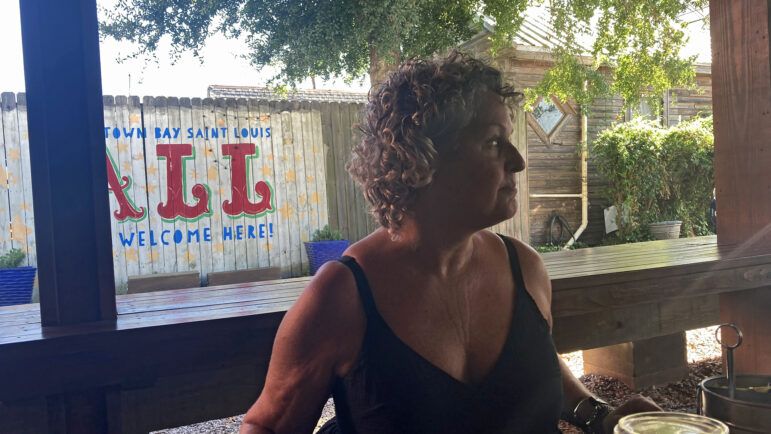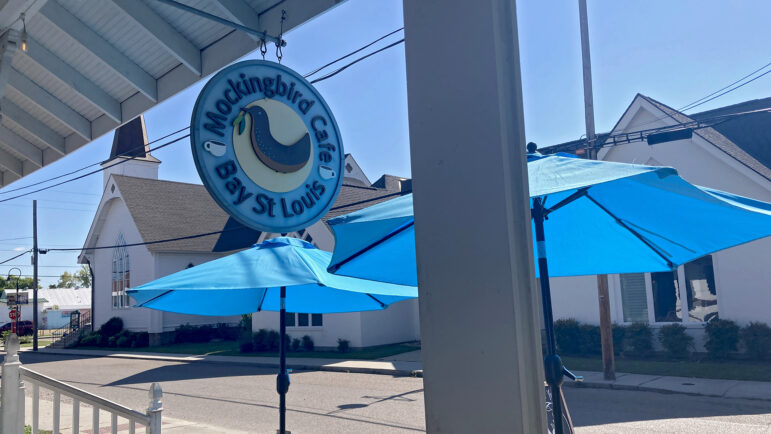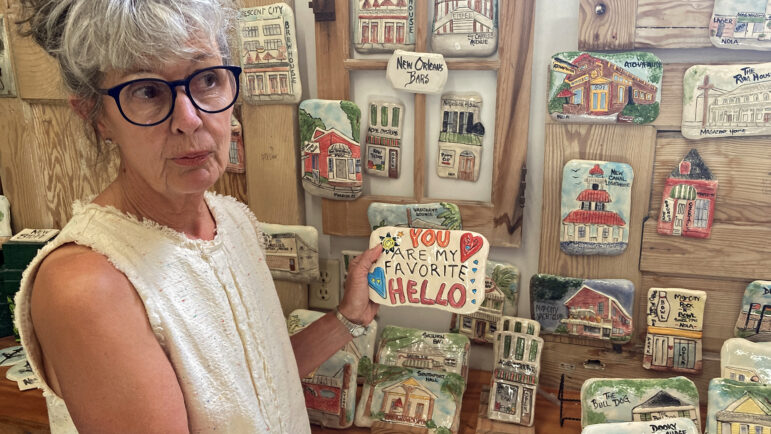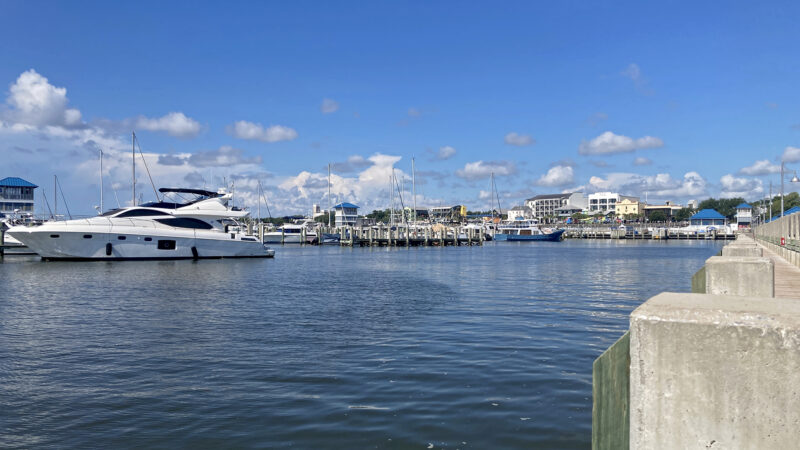Bay St. Louis became the place to be after Hurricane Katrina — for those who can afford it
Twenty years ago, Hurricane Katrina destroyed much of the Gulf Coast, including parts of the railroad that Amtrak ran a commercial line on, connecting New Orleans to Mobile, Alabama.
In mid-August, Amtrak resurrected this route — now dubbed the Mardi Gras Service. The Gulf States Newsroom’s Stephan Bisaha took part in the route’s inaugural trip.
Along the ride, he visited three coastal Mississippi cities that the route makes stops at to tell the story of how Katrina changed the Gulf Coast, and how these towns have worked to rebuild over the past two decades.
For those looking to escape New Orleans for a day — or for retirement — they often take the hour drive to the small Mississippi coast town of Bay St. Louis.
Colorful bars line Beach Boulevard and overlook the marina stretching into the Gulf. A few blocks up, local art hangs on both gallery and cafe walls.
It’s all made more remarkable considering that 20 years ago, Hurricane Katrina made landfall just a few miles away in neighboring Waveland. The storm surge wiped Bay St. Louis away, leaving behind little other than sand, mud and sewage.
“It’s like a tsunami came and crushed our little town,” Jenise McCardell, the owner of Gallery 220 in Bay St. Louis, said.

Bay St. Louis’ small-town vibes and oceanfront charm have brought back tourists and both new and former residents. But for all the celebration of the town’s recovery and growth, living here means staying in a town that is under threat of another future storm for half the year. Hurricane season is six months long.
The Mississippi paradise rebuilt, but with new costs for those who want entry — the emotional one that begins again each season and the literal cost of insuring a home in a place that’s already shown the impermanence of anything built so close to the coast.
Alicein Schwabacher drove 12 hours through evacuation traffic to Alabama to escape the storm. When she returned home, she came back to nothing — her house, her mother’s, her sister’s and their childhood home were all destroyed. A year later, she opened the Mockingbird Cafe in a building that was spared much of the flood damage as the waters were blocked by a concrete church.
The cafe became known as the town’s living room — a gathering spot during the long recovery. Customers would meet insurance agents and contractors at the cafe. Others would try to track down and return keepsakes tossed and carried away from destroyed homes.
Today, Schwabacher said Bay St. Louis is booming with hundreds of businesses opened since Katrina. And the Mockingbird Cafe has expanded, too. After Hurricane Zeta knocked down trees on the cafe’s north side, Schwabacher turned it into an outdoor space for both dining and watching live music.
“With all its growth, I think we’ve maintained our small-town charm,” Schwabacher said.

McCardell’s gallery reopened after just two months, long before much of the city. She started holding Second Saturday events, bringing bands, kegs and hot dogs for the community to get together, along with volunteers and military and medical personnel who helped in the storm’s aftermath.
Now, after 40 years, McCardell is retiring and selling her gallery. In the few months since going on the market, she’s received seven offers. With all the growth downtown, it’s rare to find property for sale.
But owning in Bay St. Louis means contending with insurance prices — that is, if you can find a company willing to provide it. For starters, it’s hard to find a company willing to provide a coverage policy. McCardell said insurers are picky, leading most people to self-insure, meaning they expect to dip into their own savings if another storm comes through — like she does.
McCardell said that for many people, this prices them out of living in the coastal town.
“Which is wrong,” McCardell said. “Because we should have everybody. That’s what makes a cool town — all kinds of people.”

This story was produced by the Gulf States Newsroom, a collaboration between Mississippi Public Broadcasting, WBHM in Alabama, WWNO and WRKF in Louisiana and NPR.
Mideast clashes breach Olympic truce as athletes gather for Winter Paralympic Games
Fighting intensified in the Middle East during the Olympic truce, in effect through March 15. Flights are being disrupted as athletes and families converge on Italy for the Winter Paralympics.
A U.S. scholarship thrills a teacher in India. Then came the soul-crushing questions
She was thrilled to become the first teacher from a government-sponsored school in India to get a Fulbright exchange award to learn from U.S. schools. People asked two questions that clouded her joy.
Sunday Puzzle: Sandwiched
NPR's Ayesha Rascoe plays the puzzle with WXXI listener Jonathan Black and Weekend Edition Puzzlemaster Will Shortz.
U.S.-Israeli strikes in Iran continue into 2nd day, as the region faces turmoil
Israel said on Sunday it had launched more attacks on Iran, while the Iranian government continued strikes on Israel and on U.S. targets in Gulf states, Iraq and Jordan.
Trump warns Iran not to retaliate after Ayatollah Ali Khamenei is killed
The Iranian government has announced 40 days of mourning. The country's supreme leader was killed following an attack launched by the U.S. and Israel on Saturday against Iran.
Iran fires missiles at Israel and Gulf states after U.S.-Israeli strike kills Khamenei
Iran fired missiles at targets in Israel and Gulf Arab states Sunday after vowing massive retaliation for the killing of Supreme Leader Ayatollah Ali Khamenei by the United States and Israel.








